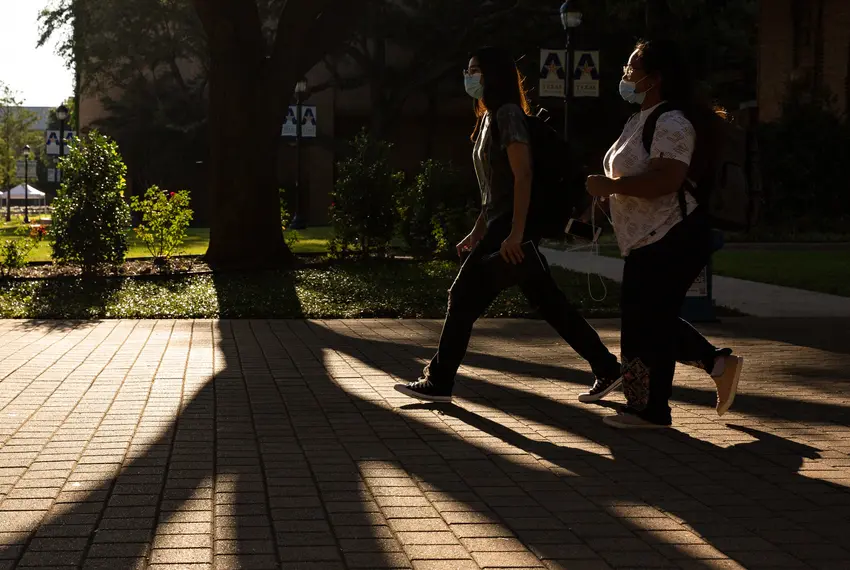- April 24, 2025
Court orders immigration officials to restore legal status of three people who came to Texas on student visas

By Jessica Priest, The Texas Tribune
“Court orders immigration officials to restore legal status of three people who came to Texas on student visas” was first published by The Texas Tribune, a nonprofit, nonpartisan media organization that informs Texans — and engages with them — about public policy, politics, government and statewide issues.
Sign up for The Brief, The Texas Tribune’s daily newsletter that keeps readers up to speed on the most essential Texas news.
Federal judges have ordered immigration officials to temporarily restore the legal status of three people from India who came to Texas on student visas.
Manoj Mashatti, Chandraprakash Hinge and Akshar Patel are among more than a thousand students nationwide whose permission to be in the U.S. was revoked. International students have been discovering in recent weeks that their immigration status was marked as terminated in a database used to keep track of international students known as the Student and Exchange Visitor Information System, or SEVIS.
Mashatti obtained an F-1 student visa to pursue a master’s degree in business analytics at the University of Texas at Dallas. He graduated in May 2024 and then applied for and received authorization to work as a full-time data engineer, according to his lawsuit. UT-Dallas informed him his status was terminated on April 2 based on a prior arrest for driving while intoxicated. He had completed probation for that charge.
Court documents provide fewer details about Hinge and Patel. Their attorney said they were both students at the University of Texas at Arlington and have graduated.
Hinge came to the U.S. in 2020 to get a graduate degree. Patel was an undergraduate student who says his immigration status was terminated from SEVIS solely because of a November 2018 arrest for reckless driving. That case was dismissed.
Both their LinkedIn profiles indicate they still live and work in North Texas, Hinge as a thermal engineer and Patel in the computer science field.
Steven Brown, the immigration attorney representing the students, filed separate lawsuits for each one against Todd M. Lyons, acting director of U.S. Immigration and Customs Enforcement, in federal courts in Washington, D.C.
The judge in Hinge’s case said ICE had offered conflicting positions in both its court filings and oral arguments about what effect its actions had on Hinge’s visa. The judge wrote in his order that the student’s legal status should remain unchanged.
Brown said none of his three clients have left the country.
He added that he may be bringing more lawsuits against ICE on behalf of other international students in Texas and across the country whose legal immigration status has been revoked.
Brown said the way ICE is targeting students appears to be “arbitrary” and “capricious.” That’s also how four UT Rio Grande Valley students who have sued the Department of Homeland Security have described federal immigration officials’ actions. Those students’ attorney, Marlene Dougherty, declined to comment to The Texas Tribune on Friday.
The federal government has said it is targeting people who have committed crimes or participated in protests it views as antisemitic.
The U.S. Department of Homeland Security, which oversees ICE, said in a statement to the Tribune that it regularly reviews whether visa holders are complying with requirements to remain in good standing. SEVIS terminations may occur for various reasons, the statement said, including if they stopped going to school or working. When it finds violations, the agency added, it notifies the Department of State, which may consider revoking the students’ visa after considering their criminal history and other national security concerns.
“This process is nothing new and is part of a longstanding protocol and program,” a senior DHS official said. “Individuals who remain in the U.S. without lawful immigration status may be subject to arrest and removal. If a SEVIS record is terminated or a visa revoked, the individual will be notified and typically given 10 days to depart the country voluntarily. The safest and most efficient option is self-deportation using the CBP Home app.”
A Department of State spokesperson said the agency does not comment on ongoing litigation and its actions in specific cases for privacy reasons.
The Consulate General for India could not be immediately reached for comment on Friday.
International students across the country are asking federal judges to temporarily block the government from changing their legal immigration status. In this week alone, judges in at least five states have granted their requests, according to CNN and Reuters.
The Texas Tribune partners with Open Campus on higher education coverage.
Disclosure: University of Texas – Arlington and University of Texas – Dallas have been financial supporters of The Texas Tribune, a nonprofit, nonpartisan news organization that is funded in part by donations from members, foundations and corporate sponsors. Financial supporters play no role in the Tribune’s journalism. Find a complete list of them here.
Tickets are on sale now for the 15th annual Texas Tribune Festival, Texas’ breakout ideas and politics event happening Nov. 13–15 in downtown Austin. Get tickets before May 1 and save big! TribFest 2025 is presented by JPMorganChase.
This article originally appeared in The Texas Tribune at https://www.texastribune.org/2025/04/18/texas-international-student-cases/.
The Texas Tribune is a member-supported, nonpartisan newsroom informing and engaging Texans on state politics and policy. Learn more at texastribune.org.

